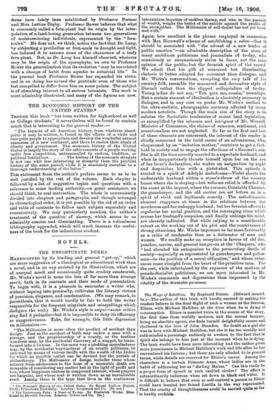NOVELS.
THE UNFORTUNATE DUKE.t
HANnicArrxn by its binding and general " get-up," which are more suggestive of a theological or educational work than a novel, and in no way assisted by its illustrations, which are ..of unequal merit and occasionally quite crudely amateurish, Mr. Wicks's novel is none the less of far more than average merit, both in its contents and their mode of presentation. To begin with, it is a pleasure to encounter a writer who, ,without lapsing into preciosity, cultivates the literary virtues of precision, elegance, and condensation. (We may remark, in .parenthesis, that it would hardly be fair to hold the writer responsible for the frequent misprints and misspellings which .,diafigare the text.) Mr. Wicks's style is soigne—some critics play find it pedantic—but it is impossible to deny its'efficiency ' or suggestiveness. Take, for example, this little digression
on millionaires • "The Millionaire is more often the product of accident than design. Just as the accident of birth may endow a man with a ,
• peerage, and the proprietorship of a county, so the tentless wanderer may, by the accidental discovery of a nugget, be trans-' formed into a Crcesns. In the same way a plodding manufacturer may, by the accidental waywardness of an erratic politician, be , endowed by means of vicious tariffs with the wealth of the Indies for which no possible outlet can be devised but the portals of philanthropy. The Millionaire of design includes those whose natures from adolescence to the hour of a miserable death. are incapable of considering any matter but in, the light of profit_and loss, whose happiness centres in Compound interest, whose prayers `are bargains, and whose soul is written down as an unrealisable asset. Among these is the type that lives 'in the continuous • The Economic History of the United Stales. By Ernest Ludlow Bogart, Ph.D., Princetown University. London: Longman/ and Co. [9a. neti.
- t The Unfortunate Duke 'a Wood vof To-day: 'By Frederick Wicks. Mow hated by Howard Penton. London: Collier and Co. [6a.]
intoxication begotten of reckless daring, and who, in the pursuit of wealth, weighs the bullet of the suicide against the profits of the stockjobber. The Millionaire of self-denial has not yet been met with."
Again, how excellent is the phrase employed in connexion with Mrs. Harewell's scheme of establishing a salon—that it should be associated with "the advent of a new leader of public emotion "—an admirable description of the aims of many ambitious politicians and journalists of to-day, who consciously or unconsciously strive to focus, not the sane
opinion of the public, but the feverish spirit of the crowd. We admit that his gift of measured but illuminating rhetoric is better adapted for comment than dialogue, and Mr. Wicks's conversations, excepting the racy talk of hie country-folk, resemble the mannered and decorative style of Disraeli rather than the clipped colloquialism of to-day. Young ladies do not say, "You quiz me, cousin," nowadays. But a certain amount of idealisation is absolutely necessary in dialogue, and in any case we prefer Mr. Wicks's method to the ultra-realistic, phonographic accuracy affected by many modern novelists. Though the main aim of the story is to satirise the Socialistic tendencies of recent land legislation, as exemplified by the schemes and intrigues. of Mr. -Virossell, Minister of Commerce, the claims of romance, sentiment, and sensationalism are not neglected. So far as the first and last of these elements are concerned, the interest of the reader is chiefly concerned in the lurid career of an adventuress, who, chaperoned by an "imitation mother," contrives to get a foot- hold in society and to engage the affections of a Baronet's son. She is all the time secretly married to a reprobate husband, and when he inopportunely thrusts himself upon her on the eve of her lover's declaration, she makes an assignation by night and despatches him with a pistol-shot. This episode is treated' in a spirit of .A.delphi melodrama—Violet shoots the undesirable husband within a stone's-throw of the country house where she is staying—but welcome relief is afforded by- the scene at the inquest, where the coroner, Constable Chunter, the gamekeeper, and the old carrier are set before us in a spirit of vivid and legitimate comedy. The melodramatic- element reappears at times in the relations between the murderess and her unhappy husband; but her feverish efforts to regularise her social position, and the converging clues which arouse her husband's suspicion, and finally unhinge his mind, are cleverly indicated. But while relying to a considerable extent on the working out of his plot and the contrivance of strong situations, Mr. Wicks impresses us far more favourably as a critic of tendencies than as a delineator of men and women. We readily make an exception in favour of old Joe, poacher, carrier, and general hanger-on at the ' Chequers,' who "had elevated his antagonism to the persecuting devils of society—especially as represented by gamekeepers and police- men—to the position of a moral obligation," and whose utter- ances come straight from the heart of the primitive man. For the rest, while entertained by the exposure of the motives of pseudo-Socialist politicians, we are more interested in Mr. Wicks's comments and digressions than impressed by the vitality of the dramatis personae.














































 Previous page
Previous page